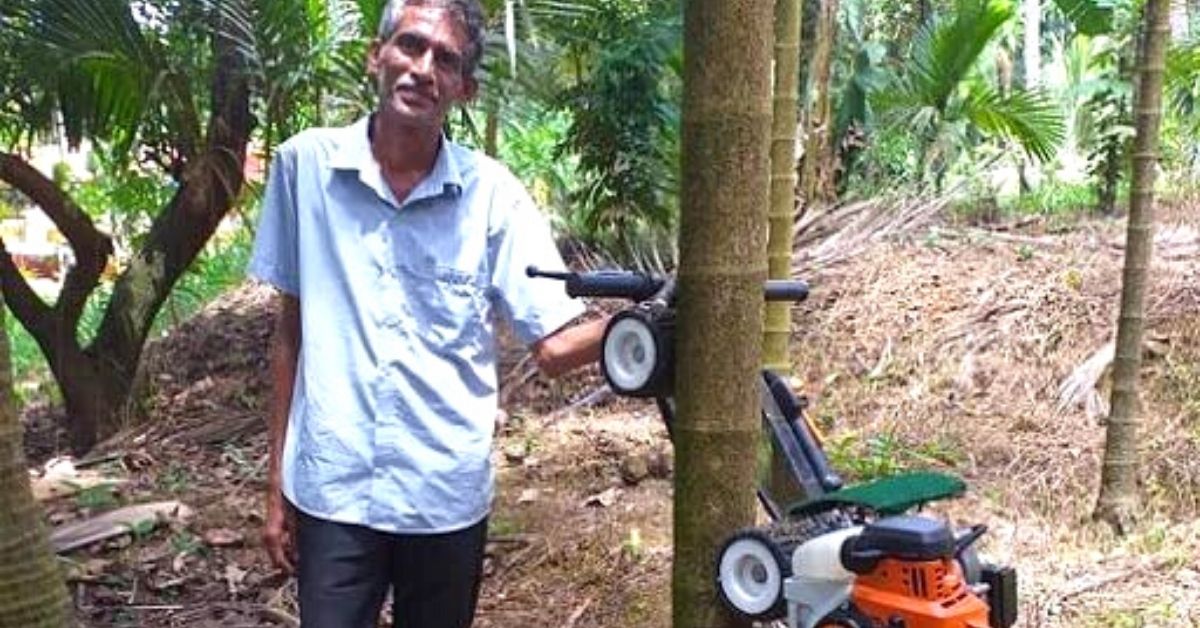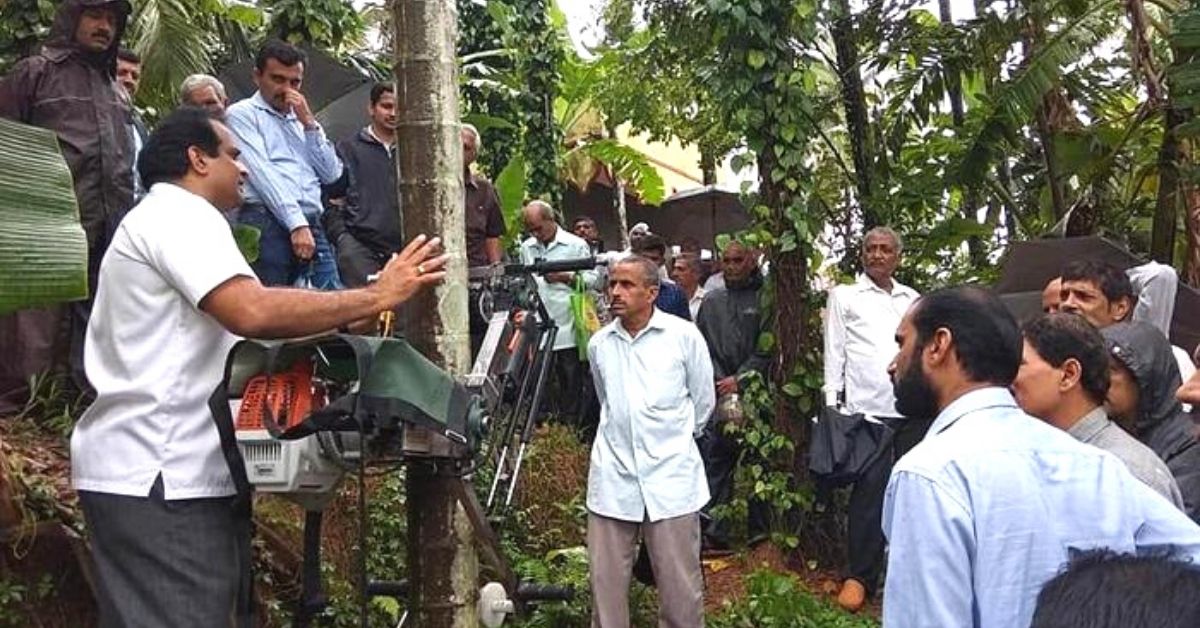This Farmer’s Bike Climbs Areca Nut Trees in 30 Seconds; Helps 700 Others
Ganapathi Bhat from Komale village in Karnataka, innovated the 'Areca Bike' with his friend Sharvin Maben. It can climb 90 trees in one litre of petrol and cuts labour costs by 20 per cent

Ganapathi Bhat from Komale village of Mangaluru, Karnataka, completed his graduation in agriculture science and started practising areca nut and coconut farming on his 14-acre ancestral land in 1991.
But, over the years, his produce was affected and his income dwindled. The worst was when his annual income halved in 2017. He analysed the situation only to realise that unreliable labour workforce and untimely maintenance of trees affected the produce.
“The labourers were irregular and it affected the timely spraying of pesticides or pruning of trees, which is needed every few days,” he says, adding that the labour costs increased multifold. “Each labourer charges Rs 2,000 a day, and I needed at least four daily, which would cost me Rs 8,000. I needed these labourers for at least four days to cover the entire plantation,” the 51-year-old tells The Better India.
It was this predicament that led him to come up with an innovative ‘Areca Bike’, which climbs 84-meters-tall Areca nut trees in 30 seconds. The compact and easy to use machine helped reduce the labour, cutting his expenses by 20 per cent. He has sold 700 bikes at manufacturing cost, without earning any profits from it.
About the tree climbers

Ganapathi had no technical or engineering background but still managed to come up with a foolproof design.
“As technology has advanced in all fields, I was sure to find a machine that could do the cutting, spraying of pesticides and taking care of the areca nut trees too. I approached my friend Sharvin Maben, who owns an automobile workshop, to discuss the concept,” he says, adding that he worked as a technician with him occasionally and learned about machine operations.
Interestingly, they came up with another machine before he conceived the final product. Within a year, the duo came up with a device that could climb the trees and spray chemicals too. “However, it was not an efficient model, and only manual intervention could help complete the required tasks. So, we went back to the drawing board to work on a machine that would fit a human,” he says.
Ganapathi and Sharvin worked for two more years and came up with a unique machine in 2020 that could carry a person weighing up to 80 kilos. The bike weighing 28 kilos came with multiple features and advantages.
It has a two-stroke engine, hydraulic disc brakes, double shock absorbers, climbs 90 trees in one litre of petrol, is easy-to-carry and costs Rs 59,000, offering one year guarantee.
“A person takes about five to eight minutes to climb the areca nut tree but the machine does it in seconds, without tiring the climber. Moreover, it is safe and can move around the tree. This reduces the effort and time drastically,” Ganapathi says.
Explaining its functioning, Ganapathi says the machine has two tyres and a roller that interlocks to grasp the tree’s smooth trunk. The user has a small seat with a petrol tank fitted below it. The machine has a handle to control the acceleration and braking. The bike enables one to hold the trunk without using their hands. The hydraulic brakes serve as an additional safety feature.
While labourers would only be able to work till up to the age of 55, the machine faces no such restrictions. “In fact, the machine allows the user to work for a few more years, thus adding to their income years,” Ganapathi says.
The machine also saves him thousands of rupees per day and requires one labourer to do the work. “The labourers used to work for four to five days a week, as the conventional method was limited to covering fewer trees per day. But today, a single labourer can complete the work of four. This saves about Rs 24,000 a week in labour costs,” he adds.
Soon, the bike became the talk of the town. Raja is one labourer who got his hands on the bike, and says, “There are always safety concerns while climbing trees manually. It becomes much more difficult during the monsoon when the surfaces are slippery. The added advantage of the bike is that one can complete the work on one farm in a day. It allows me to take on work at multiple farms in a week and earn more rather than simply earning from a single farm.”
Raja says that many labourers avoid this type of work as it is a physically demanding activity. “But the machine removes the element of physical labour and makes it an attractive earning prospect,” he says.
Not for profit

To build the climber was no easy feat as Ganapathi faced the risks before he ensured the bike was safe.
“The machine worked fine, but the wheels failed to achieve a good grip and slipped. It became a risky affair. I started trying multiple tyres with varying grips that were best suited for holding the trees,” the farmer says, adding, “I remember falling at least eight times. There was no one else to take on the risks during the trials. The tyres slipped after a certain height causing bruises and injuries to my body.”
Recalling a particular incident, Ganapathi says he nearly broke his leg, after which he started calling for an ambulance in advance. “My daughter Supriya used to dial the ambulance before I started trials for that day. This way, the ambulance could quickly take me to the hospital,” he chuckles.
After trying 18 types of tyres, he finalised a moulded one.
Ganapathi says that no investor sponsored the research and development work for the prototype. “I never had a commercial interest in it. The machine was derived aiming to make a labourer’s job easier. So, I do not earn any profits from its sales,” he says.
He earns Rs 30 lakh from selling areca nuts, out of which Rs 20 lakh are profits. “I save about 20 per cent of the labour expenses that add to my profits,” he adds.
Supriya has also become a user of the Areca Bike when labourers are unavailable. “The machine knows no gender or the age limit. Anyone can ride it. Earlier, I felt scared to use the bike, but eventually became comfortable using it,” she says.
She adds that she is proud of her father’s innovation that is helping hundreds of farmers. “I never learned to climb an areca nut tree but with this bike, anyone can. This also creates an opportunity for people with no experience to start earning an income,” Supriya says.
For more information on the bike or to place an order, Ganapathi can be reached at +919632774159.
Edited by Yoshita Rao
If you found our stories insightful, informative, or even just enjoyable, we invite you to consider making a voluntary payment to support the work we do at The Better India. Your contribution helps us continue producing quality content that educates, inspires, and drives positive change.
Choose one of the payment options below for your contribution-
By paying for the stories you value, you directly contribute to sustaining our efforts focused on making a difference in the world. Together, let’s ensure that impactful stories continue to be told and shared, enriching lives and communities alike.
Thank you for your support. Here are some frequently asked questions you might find helpful to know why you are contributing?


This story made me
-
97
-
121
-
89
-
167













